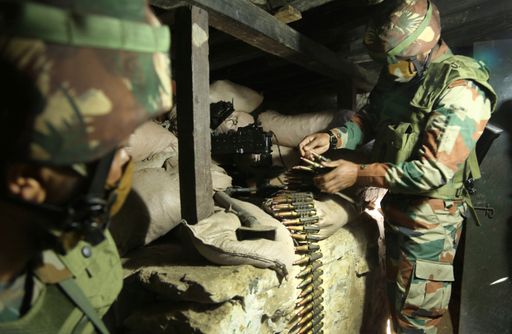US Secretary of State Marco Rubio has called for de-escalation of tensions in South Asia after last week's attack in India-administered Kashmir left dozens dead, bringing India and Pakistan to the brink of another border crisis.
Rubio spoke separately with Indian Foreign Minister Subrahmanyam Jaishankar and Pakistani Prime Minister Shehbaz Sharif on Wednesday while expressing support to India in combating extremism and urging Pakistan to cooperate in probing the attack that killed more than two dozen people, the US State Department said in separate statements after the calls.
In a phone call with India's top diplomat Jaishankar, Rubio voiced solidarity but also encouraged caution as India, without sharing any evidence yet, accuses Pakistan of backing the attack in Pahalgam area. Islamabad denies India's charge and seeks an international probe.
"The Secretary expressed his sorrow for the lives lost in the horrific terrorist attack in Pahalgam, and reaffirmed the United States' commitment to cooperation with India against terrorism," Bruce said.
"He also encouraged India to work with Pakistan to de-escalate tensions and maintain peace and security in South Asia."

Call with Pakistan PM
In the call with Pakistani Prime Minister Shehbaz Sharif, Rubio "spoke of the need to condemn the terror attack on April 22 in Pahalgam," the tourist hub in India-administered Kashmir, State Department spokeswoman Tammy Bruce said.
Rubio "urged Pakistani officials' cooperation in investigating this unconscionable attack," she said in a statement.
Sharif urged the US to impress upon India to dial down the rhetoric and act responsibly, his office said in a statement.
Sharif accused India of "escalatory and provocative behaviour" in a call with Rubio, adding "India's provocations would only serve to distract Pakistan from its ongoing efforts to defeat terrorism, particularly from militant groups."
Kashmir dispute
Following the attack, both sides have implemented a series of retaliatory measures.
India suspended a crucial water-sharing Indus Water Treaty with Pakistan and closed the only functional land border crossing. It revoked visas issued to Pakistanis with effect from Sunday.
Pakistan retaliated by cancelling visas issued to Indians, closing its airspace to Indian airlines, halting trade with its neighbour and suspending Simla Agreement with India. The 1972 treaty was aimed to establish peace and resolve disputes bilaterally, particularly focusing on the Kashmir dispute.
India and Pakistan have fought over the former princely state since their independence from British rule in 1947, with the border splitting generations of families.
Rebels in the Indian-run area have waged an insurgency since 1989, seeking independence or a merger with Pakistan.
New Delhi, which has deployed some 500,000 troops in Muslim-majority India-administered Kashmir, describes the armed rebellion in Kashmir as "Pakistan-backed terrorism", a charge Pakistan rejects.
In recent weeks, the Modi government has intensified its crackdown on Muslim organizations, literature, and schools, triggering unrest across the region.
At the same time, India has issued 82,000 domicile certificates to non-Kashmiris in the disputed territory, fueling concerns over deliberate demographic shifts.
In the wake of the Pahalgam attack, over 1,500 people have been arrested in India-administered Kashmir.
Meanwhile, reports have emerged of Kashmiri Muslims—mostly students—being assaulted by Hindu right-wing mobs in several Indian cities.



















